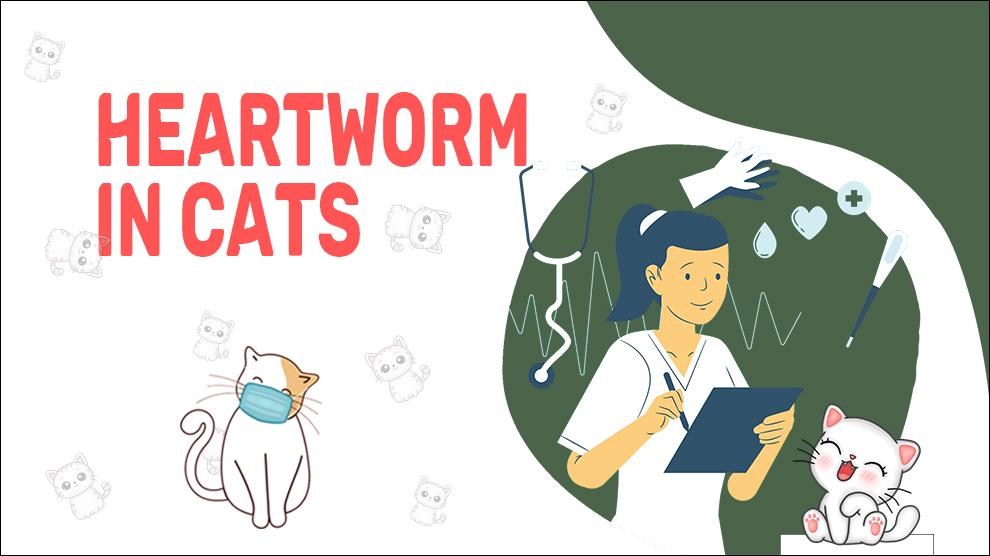What Is Heartworm Disease In Cats?
Heartworm disease is a serious and potentially fatal condition caused by a parasitic worm that lives in the heart and lungs of infected cats.
While heartworms are more commonly associated with dogs, they can also affect cats.
The disease is transmitted through the bite of an infected mosquito and can cause severe damage to the heart, lungs, and other organs if left untreated.
Clinical Signs Of Heartworm Disease In Cats
The symptoms of heartworm disease in cats can be vague and nonspecific, and some cats may show no signs at all.
Early signs of infection may include coughing, vomiting, and lethargy.
As the disease progresses, cats may experience difficulty breathing, rapid breathing, and weight loss. In severe cases, heart failure and collapse may occur.
- Increased Heart Rate
- Wheezing
- Gagging
- Vomiting
- Diarrhea
- Lack Of Appetite
- Weakness
- Exercise Intolerance
- Heart Murmur
Treatment Options For Heartworm Disease In Cats
The treatment of heartworm disease in cats can be complicated and is not always successful.
Treatment options include medication to kill the adult worms and manage symptoms such as coughing and difficulty breathing.
In some cases, surgery may be necessary to remove the worms from the heart and lungs.
Cats with severe heartworm disease may require hospitalization and supportive care, including oxygen therapy and fluid therapy.
Home Remedies For Heartworm Disease In Cats
Unfortunately, there are no known home remedies for heartworms in cats. The only effective treatment for heartworms in cats is a medication prescribed by a veterinarian.
How To Prevent Heartworm Disease In Cats?
Prevention is the key to protecting cats from heartworm disease.
This can be achieved through the regular use of heartworm preventive medication, which can be administered orally or as a topical application.
It is important to use preventive medication year-round, as mosquitoes can be active even in cooler weather.
Additionally, minimizing exposure to mosquitoes by keeping cats indoors during peak mosquito activity hours and using mosquito repellents can help reduce the risk of infection.
Affected Cat Breeds Of Heartworm Disease
All cats are at risk of heartworm infection, but outdoor cats and cats living in areas with a high mosquito population are at greater risk.
Additionally, cats that have not been on regular heartworm prevention medication are more vulnerable to infection.
Certain breeds, such as the American Shorthair, may also be more susceptible to heartworm disease.
Causes For Heartworm Disease In Cats
Causes:
Heartworm disease is caused by a parasitic worm called Dirofilaria Immitis. These worms are transmitted through the bite of an infected mosquito.
When a mosquito bites an infected animal, it picks up microfilariae (larval heartworms) from the animal’s bloodstream.
These microfilariae mature into infective larvae within the mosquito and are then transmitted to a new host (a cat) when the mosquito bites again.
When To See A Vet For Heartworm Disease In Cats?
If you suspect your cat has been infected with heartworms, it is important to seek veterinary care as soon as possible.
Your veterinarian can perform a blood test to check for heartworm infection and can recommend an appropriate treatment plan.
Additionally, if your cat is exhibiting any of the symptoms of heartworm disease, such as coughing or difficulty breathing, it is important to seek veterinary care immediately as these symptoms can be indicative of a serious health problem.
Food Suggestions For Heartworm Disease In Cats
There are certain foods and supplements that may help to support a cat's immune system and overall health, which can help to prevent heartworms from becoming a problem in the first place.
These include:
- High-quality cat food: Providing a well-balanced diet with high-quality proteins, healthy fats, and essential nutrients can help to keep your cat's immune system strong and support overall health.
- Omega-3 fatty acids: Fish oils or supplements containing omega-3 fatty acids can help to reduce inflammation and support heart health.
- Garlic: Garlic is sometimes recommended as a natural heartworm preventative for dogs, but it is not recommended for cats as it can be toxic to them.
- Probiotics: Probiotics can help to support the digestive system and promote a healthy immune system.
It's important to note that while a healthy diet and supplements can help to support your cat's health, they should not be relied on as a sole means of heartworm prevention.
Conclusion
Heartworm disease is a serious and potentially fatal condition that can affect cats.
Prevention is key through the use of monthly heartworm prevention medication and reducing mosquito populations around the home.
Early diagnosis and treatment are crucial for the best possible outcome, and pet owners should seek veterinary care if they notice any symptoms of the disease.











